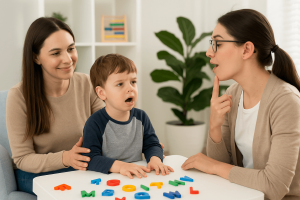Articulation Disorder in Children: Signs, Causes & Treatment
By Rajini D
Last Updated: October 7, 2023
Articulation disorder or Speech sound disorder is a commonly found speech disorder where the child won’t be able to speak specific sounds correctly. The most common examples of such incorrect pronunciations are replacing “ka” with “ta” and “ra” with “la”. The good news is that it is not related to any brain functioning issue or hearing loss. So, a speech therapist or speech-language pathologist can diagnose the condition and help the individual to communicate clearly using therapy techniques. Articulation disorder is also called functional speech disorder or articulation delay.
In other words, Articulation disorder occurs when a child produces certain syllables or sounds with inappropriate pressure, placement, coordination, and timing for communicating thoughts. It is important to understand that several children make articulation errors during their developmental stages.
Signs and Symptoms of Articulation Disorder
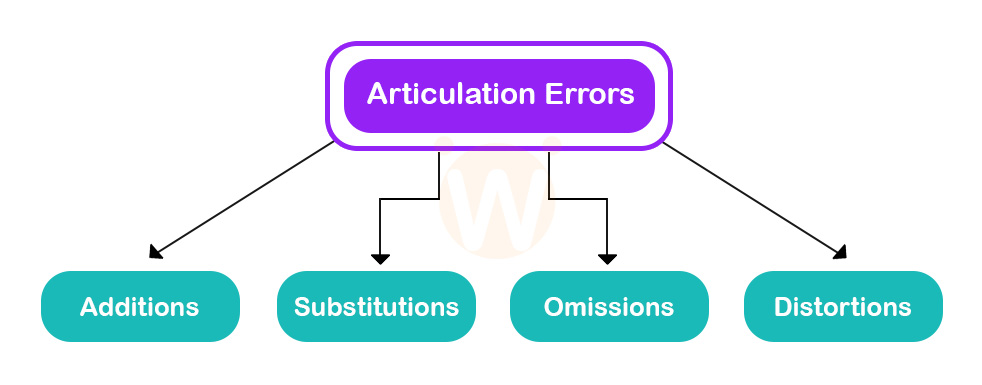
The most commonly found articulation errors among children are:
- Addition: Addition of extra sounds or syllables that are actually not present. For example, “Ismayil” for “Smile.”
- Substitution: Substitution of one sound with another, i.e., replacement. For example, using “na” instead of “la”
- Omission: Omission of certain sounds completely from their speech. For example, omitting “h” from “hoping.”
- Distortion: Distortion of sounds in the speech, where one sounds like another. For example, when “words” sound like “wordth” in pronunciation.
Besides these symptoms, people often get confused for Articulation disorder with Phonological disorder.
How is Articulation Disorder diagnosed?
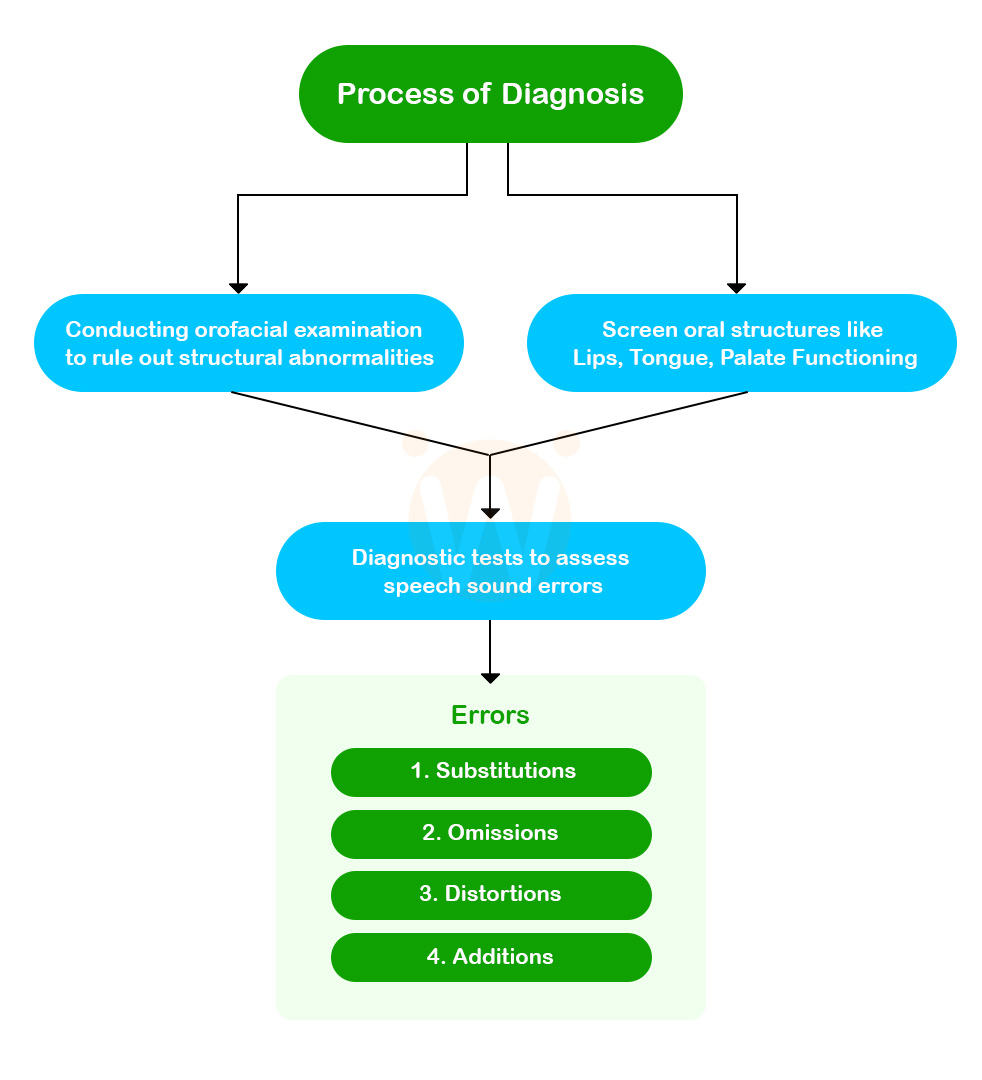
If you meet a healthcare provider with your concerns, they conduct a physical evaluation to rule out certain basic probabilities, such as hearing loss. If the speech disorder is not due to a medical issue, then the speech and language pathologist is referred for examination.
Speech therapist checks all the possibilities by following certain procedures like
- Conducting the peripheral oral examination
- Verifying with child’s speech imitation skills
- Discussing any family history of speech disorders
- Observing the movement of oral structures for speech production
- Understanding receptive and expressive language skills
- Diagnosing through evaluation checklist
After all these checks, the speech therapist comes to a conclusion. To understand the speech issue, one should be aware of the symptoms that indicate it.
Why does Articulation disorder occur?
Generally, children face a few issues when they learn to speak. But if that turns out to be a speech condition, it highly affects their communication. Articulation disorder occurs if there is a family history of speech issues, wherein any close relative has any kind of speech issue. Also, such speech problems are likely to occur if the mother faces complications during pregnancy and childbirth.
While speech sound disorders are common among 8% to 9% of children, for some reason, boys are more likely to have speech issues than girl children. There is no known cause for Articulation disorder and Phonological disorder. These disorders can occur due to issues in structural movement, poor imitation skills, and sustenance of some bad habits in communication. Developmental Dysarthria can be caused by impaired nerve and muscle function. Mostly, a child’s clarity of speech can be affected by issues like hearing impairment, tongue tie, cleft palate, or any pediatric strokes and syndromes.
How do we know if the child has an Articulation disorder?
Every little one tries to babble around 6 months of age and starts learning new sounds and words slowly. Mostly around 5 years of age, a child will be able to speak clearly. If the speech is still not clear and they are making errors in pronouncing certain speech sounds, it is better to take an evaluation. A speech and language pathologist can evaluate your child and diagnose if it is an articulation disorder. However, any such issues can be treated using therapeutic techniques.
Signs of Articulation Disorder In Toddlers
Many toddlers make speech errors as they learn to talk. However, if your child continues to exhibit certain patterns of mistakes past typical developmental milestones, it might be a sign of an articulation disorder. Here are some red flags to watch out for:
- Sound substitutions: Does your toddler consistently replace certain sounds with others? For example, saying “wadio” instead of “radio” or “tup” instead of “cup” could indicate difficulty with /r/ and /k/ sounds.
- Sound omissions: Pay attention if your child frequently leaves out sounds altogether. For instance, omitting the final consonant sound in words like “wat” for “hat” or “tay” for “cake”.
- Sound additions: Be mindful if your toddler adds extra sounds to words where they don’t belong. Examples include saying “puh-lay” for “play” or “nana” for “banana”.
- Sound distortions: Sometimes, a toddler might not be making a sound completely wrong but rather warping it in a way that sounds unclear. For instance, a lisp where “s” sounds turn into “th” sounds.
- Limited sound development: If your toddler seems stuck at a particular stage in their babbling or isn’t progressing towards using a wider range of sounds by a certain age, this could be a cause for concern.
Articulation Vs Phonological Disorder
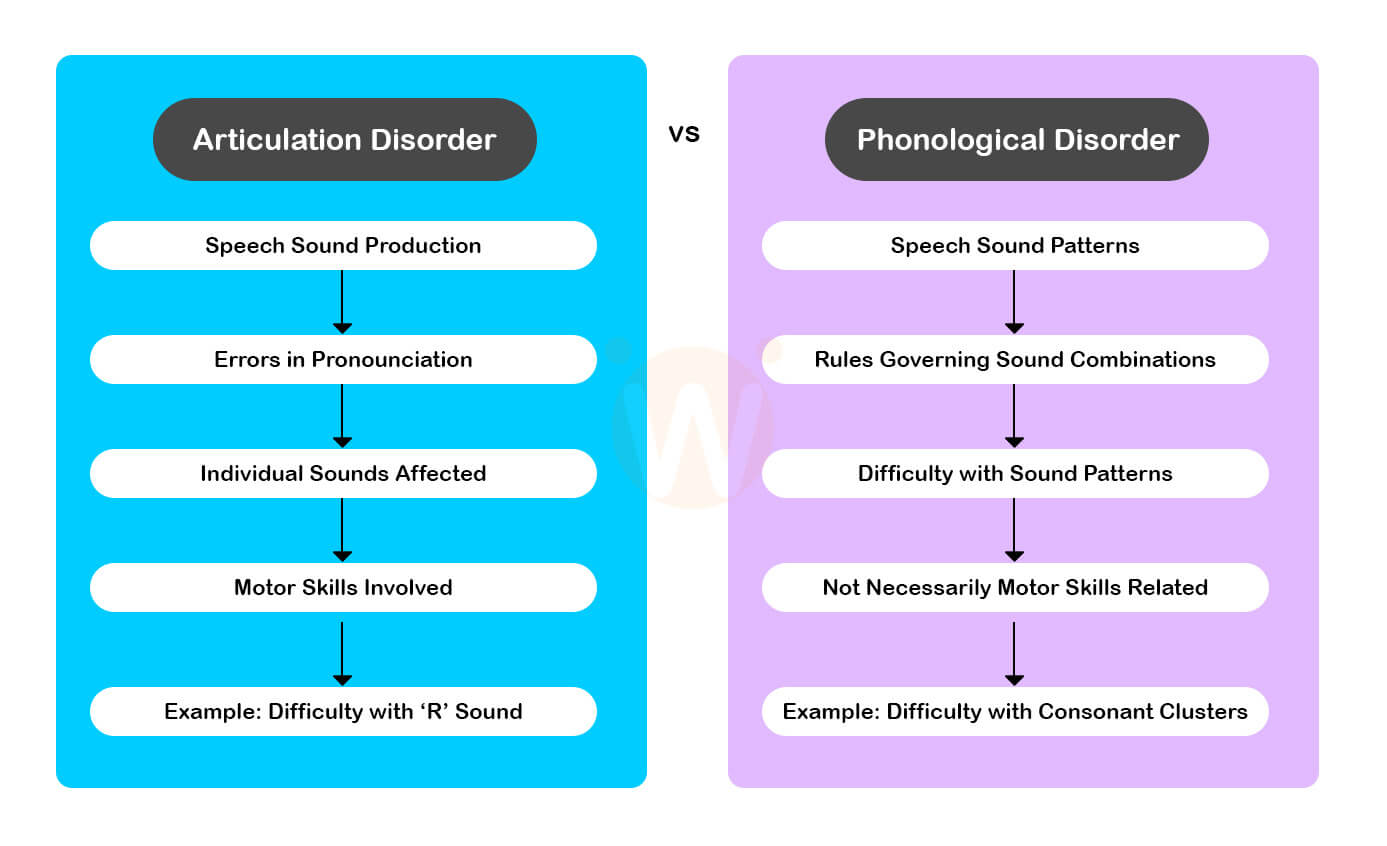
The essential factors of speech production, such as lips, teeth, tongue, jaw, palate, and control of airflow, need coordination to speak.
Articulation Disorder:
Children with Articulation disorders face issues in coordinating with motor functions to produce certain speech sounds. When an individual has difficulty in producing a single sound or a few sounds without any pattern past the age of typical development, that individual is said to have an articulation disorder. This is an issue with the motor function of producing speech sounds.
- The errors are limited to only a few sounds and are consistent
- They involve difficulty with consonant sounds
- These are typically caused by incorrect tongue placement or movement
Phonological Disorder:
The phonological disorder occurs at the linguistic or cognition level. Phonological disorders occur due to the difficulty of organizing speech sounds in the brain, resulting in the production of incorrect speech sounds.
In some kids, both these conditions co-exist. However, if not treated, these conditions may continue into adulthood.
What happens if children have such Speech issues?
If a child has such speech issues, it is evident that they exhibit certain behaviors.
- They avoid public speaking or speaking to strangers
- Their friends get very limited in number
- They feel too shy to mingle with others.
- They become unusually quiet.
- They willingly avoid some words.
- They avoid functions and going out.
- They get frustrated while speaking.
- Their confidence gets low.
- Their self-esteem also decreases.
When speech disorders are not treated during childhood, they get carried into adulthood and affect their personality. These individuals feel shy about speaking in public and even among friends. This results in social isolation, limiting their capacity to learn social skills.
All this happens because they can sense that something is not right with their pronunciation, and their inability hurts them a lot. If treated early, they can pick up and cope with their issue positively, and they are improving in their speech. With dedicated practice and using the techniques suggested, they can speak normally in a short time. Such positive change increases their confidence, which is reflected in their progress.
Benefits of Speech Therapy for Articulation Disorders
Here’s an enhanced section focusing on the benefits of speech therapy for articulation disorders, incorporating relevant keywords:
1. Improved Speech Clarity and Intelligibility:
One of the most significant benefits of speech therapy for articulation disorders is achieving clearer and more intelligible speech. Through targeted exercises and practice, children with articulation difficulties can learn to produce sounds correctly, allowing them to be understood by others with greater ease. This boost in clarity can significantly improve their confidence and communication skills.
2. Enhanced Social Interaction and Participation:
Clear speech is fundamental for effective communication. When a child struggles with articulation disorders, it can hinder their ability to interact and participate socially. Speech therapy helps children overcome these challenges, enabling them to express themselves confidently and engage meaningfully with their peers. This improved social interaction can lead to stronger friendships, better academic performance, and a greater sense of belonging.
3. Increased Self-Esteem and Confidence:
Articulation disorders can sometimes lead to feelings of frustration and embarrassment in children. Speech therapy empowers them to overcome these challenges and develop proper speech production. As they master the correct sounds and experience improved communication, their self-esteem and confidence naturally increase. This newfound confidence can positively impact all aspects of their lives.
4. Long-Term Benefits for Learning and Success:
Clear communication is essential for academic success. Children with untreated articulation disorders may struggle to participate in classroom discussions, express themselves in writing assignments, or follow instructions. Speech therapy helps them overcome these hurdles, laying a strong foundation for success in school and beyond.
5. Additional Benefits:
Speech therapy can also address underlying causes of articulation disorders, such as weak oral motor skills or difficulty with auditory processing. By targeting these areas, therapists can provide a holistic approach to improving a child’s overall speech and communication abilities.
Early Identification and Intervention
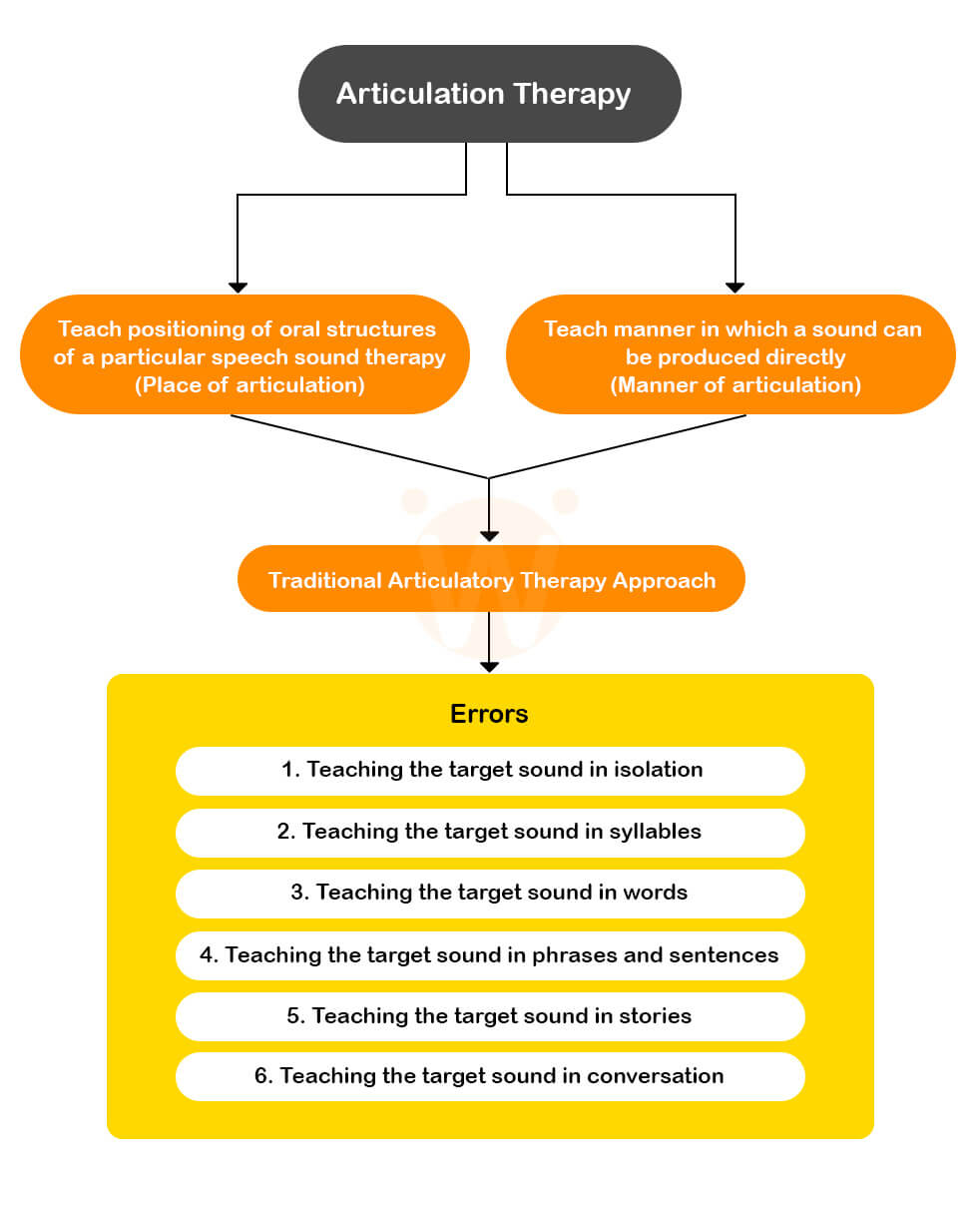
When an issue is identified, it is always important to start working on the solution as soon as possible. Early identification and intervention in case of speech issues helps the child a lot. As speech and language issues develop at an early age, it is important to recognize the potential issues and provide support.
Speech and language pathologists (SLPs)
Speech and language pathologists are the trained professionals who assess and train individuals with speech issues, such as Articulation disorders, with evidence-based therapies. These interventions and techniques help the individuals to overcome the symptoms of articulation, phonological, and language-related speech issues.
Speech and language pathologists work in a systematic order by assessing and preparing a therapy plan, and by providing individualized therapy sessions. They also conduct a review after a certain time period to check if there needs to be an improvement in the therapy plan according to the needs of the child.
Assessment
Speech and language assessments are made to understand specific speech sound errors and their underlying issues. These assessments can be made using standardized tests, informal observations, and consultations with other healthcare professionals.
Individualized therapy plans:
Once the assessment is made, speech therapists make individualized therapy plans tailored to the unique needs of the child. These therapies include oral motor exercises, activities, and strategies to address specific articulation issues.
The Speech Language Pathologists (SLPs) can teach the person how to produce the error sounds correct by teaching them how to position the different oral structures for a particular sound and the manner in which they can produce them correctly. A systematic approach to teaching the sounds in syllables, words, sentences, and connected speech is used.
Family involvement:
It is often important to involve the family in the intervention process. Speech therapists provide better insights and offer plans and strategies to be implemented at home that help to reinforce the learning in therapy sessions.
Wellness Hub offers a team of experienced speech therapists who can provide speech therapy for Articulation disorders both online and offline. Our Speech Basics App helps in continuing the effect of therapy even after the sessions. With speech exercises and practice videos, this app can help parents and caregivers to reinforce their learning. We offer free speech consultations, too. Click to claim yours today!
About the Author:
Rajini Darugupally
M.Sc., Speech-Language Pathologist (9+ years of experience)
Rajini is a passionate and dedicated Speech-Language Pathologist with over 9+ years of experience, specializing in both developmental speech and language disorders in children and rehabilitation in adults. Driven by a desire to empower each individual to find their voice, Rajini brings a wealth of experience and a warm, genuine approach to therapy.
Currently, at Wellness Hub, she thrives in a team environment that values innovation, compassion, and achieving results for their clients.
Connect with Rajini to learn more about how she can help you or your loved one find their voice.
Book your Free Consultation Today
Parent/Caregiver Info:
Client’s Details:
* Error Message





